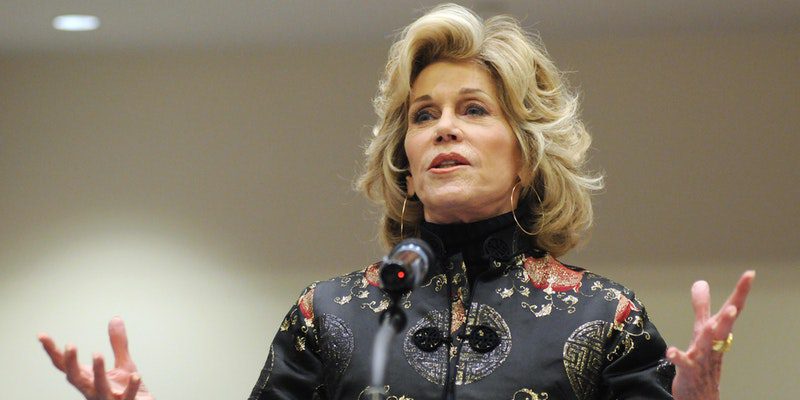Fonda: ‘Initiative 77 Cuts Sexual Abuse in Half’
By • July 16, 2018 0 644

“Initiative 77 cuts sexual abuse in half and allows women and other restaurant workers to be less vulnerable,” said Academy Award-winning actress and longtime political activist Jane Fonda on the steps of the John A. Wilson District Building on July 13.
Fonda came to “stand with working women” and to speak in support of the “One Fair Wage DC” proposal that voters passed in the June 19 primary election. Earlier in the week, a majority of the District Council introduced legislation to repeal the measure. In addition, the U.S. Congress entertained a proposal to prohibit D.C. from funding it.
If funded, Initiative 77 would guarantee the same minimum wage for all D.C. employees — including tipped waitstaff and bartenders — by 2026. Without the new law taking effect, the minimum wage for non-tipped employees of $13.25 is set to rise to $15 an hour in 2020; the minimum hourly wage for tipped employees, now $3.33, would increase to $5.
Current “tip credit” regulations require employers to make up any difference between the minimum wage for tipped employees, supplemented by tips as indicated on credit-card receipts, and the minimum wage for non-tipped-employees. This requirement would be gradually rescinded under Initiative 77.
But Fonda pitched it as a woman’s issue. “Women are more likely to face scrutiny and hostility on the job, making them more susceptible to not being tipped,” she said.
Fonda and other supporters of the initiative, sponsored by advocacy group Restaurant Opportunities Centers United, claimed at the noon rally that many of those who voted in favor of the measure are working-class minorities struggling to make ends meet.
“I’ve been working with Restaurant Opportunities Centers for a number of years,” said Fonda. “When I heard two days ago [that the Council was seeking to void the favorable vote], I was stunned. I was here last fall also talking to them. I was sure that they would support the voice of the people. I really believed that.”
The Rev. Dr. Aaron B. Wade of the Community Church of Washington, DC, agreed. “As a pastor, I have had the opportunity to see several members of my congregation who are servers that earn minimum wage,” Wade said at the rally. “These folks talk about how they have to struggle to decide if they want to have a life that is healthy, a life that has spirituality in it, or if they have to choose to take on an extra hour or hours at work. This is not right.”
“This fight is about who gets to decide what women of color make in the District — the big business lobby or constituents of D.C.,” said Diana Ramirez, executive director of the Restaurant Opportunities Center of D.C. “It’s not even about whether you support One Fair Wage and lifting workers out of poverty anymore. This is about respecting the Democratic process and the will of the people.”
“In many cities across the country, elected officials — and we know that here in D.C. — are more beholden to big business, special interests and trade organizations like the National Restaurant Association than the actual people that voted them into office,” said Chris Melody Fields Figueredo of the Ballot Initiative Strategy Center. “These attacks are lawlessness.”
However, in a July 15 editorial, the Washington Post wrote that the vote for the initiative of less than 10 percent of registered voters (47,230 of 480,000) “is hardly a mandate. We might feel differently if Initiative 77 had been approved in a general election.”
The editorial also pointed out that “the council members have their own independent electoral basis and the democratic legitimacy that goes with that. They are elected to exercise their best judgment on how various proposals fit into overall goals for the city’s economy.”
Opponents of Initiative 77 claim that the proposal would eventually end tipping in the District, with significant consequences. To continue to earn tips, workers could leave D.C. positions for jobs in Maryland and Virginia. Many restaurants would be forced to raise their prices or add a supplement, they predict. Some would be forced to close, and new ones discouraged from opening in the District.
Fonda disagreed. “That’s just bull. The National Restaurant Association — the other NRA — is trying to persuade the city council to not support the voice of the people in D.C. by claiming tips and restaurants will disappear. It’s not true,” the 80-year-old Fonda said to the fewer than 100 people gathered on the steps of the Wilson Building.

